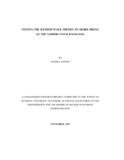Testing the Random Walk Theory on Share Prices At the Nairobi Stock Exchange
| dc.contributor.author | Githiga, Martin | |
| dc.date.accessioned | 2013-01-25T09:19:48Z | |
| dc.date.issued | 2007-11 | |
| dc.identifier.uri | http://erepository.uonbi.ac.ke:8080/xmlui/handle/123456789/8006 | |
| dc.description | MBA Thesis | en |
| dc.description.abstract | This study examine whether share prices of companies trading at the Nairobi Stock Exchange follow a random walk trend. We provide evidence that expert analysis can not be used to earn investors an abnormal profit at the exchange. The autocorrelation model was used to test the random walk hypothesis. A sample of sixteen stocks was drawn from companies that comprised the NSE 20 share index during the five year period between September 2003 and August 2007. Weekly average prices are shown to exhibit significant random walk behavior in the sense that the autocorrelation coefficient was less than 0.5 but more than -0.5 throughout the period. The results of the study confirmed that stock prices followed a random walk and that one cannot predict future prices based on the past price trends. | en |
| dc.language.iso | en | en |
| dc.publisher | University of Nairobi, School of Business | en |
| dc.subject | Random Walk Theory | en |
| dc.subject | Share Prices | en |
| dc.subject | Nairobi Stock Exchange | en |
| dc.title | Testing the Random Walk Theory on Share Prices At the Nairobi Stock Exchange | en |
| dc.type | Thesis | en |

